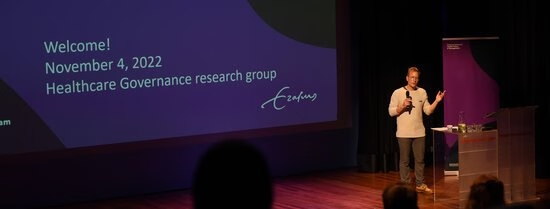On Friday November 4, the conference ‘Caring geographies: the coproduction of care and sustainable living in urban and non-urban areas’ took place, organised by Erasmus School of Health Policy & Management. Below some highlights of the thought-provoking plenaries and lively panel discussions.
The caring region
Regional areas are increasingly being (re)discovered and addressed by policymakers and practitioners as places for organising public services. For instance, “regionally-based” healthcare policies are considered suitable for handling contemporary challenges in healthcare, like increasing demands for older persons in the face of a declining workforce. The regional scale promises an unambiguous and therefore tempting solution as a space to break through restrictive institutional frameworks or abrasive and long-existing systems. Against this background, the aim of the conference was to reflect on the region as a research object in the domain of medical and social care, and more particularly the current re-evaluation of the region in healthcare governance and policy.
Thinking space relationally
With a view from Britain, Dr. Colin Lorne (Open University) discussed how ‘thinking space relationally’ can offer a powerful way of studying the remaking of regions in healthcare and beyond. He argued that thinking geographically—and a relational understanding of space—can help us better understand the making, unmaking and remaking of regions in health, care and beyond. If we are to move beyond taken-for-granted understandings of regions as pre-existing bounded territories, then what might that mean for those involved in making and researching health and care policy?
Practices of care
Zooming in on the individual level, Professor Louise Meijering (University of Groningen) discussed how older adults, people with memory issues and stroke survivors experience practices of care, while using ‘activity space’ as a central concept. This concept illuminates the importance of patient’s living environment and can shed light on micro caring geographies. She presented findings from a mixed-methods approach where she combines qualitative methods such as in-situ and in-depth interviews with spatial methods such as GPS-tracking. At the end of the presentation she prompts the question, and there is discussed with the audience, how to connect individual and systematic worlds of care.
A science-policy-practice relationship
Drawing on the concept of ‘trading zones’ (Galison, 1997), Dr. Iris Wallenburg showed how regional collaboration in Dutch older person care was sought, experimented with, and negotiated among the actors involved in the context of a developing (and growing) science-policy-practice relationship. She reflected on how healthcare organizations, experts and policymakers create the region as a physical, administrative and symbolic place of older person care. The narrative showed how regional collaboration was sought, experimented with, and negotiated among the actors involved in the context of a developing (and growing) science-policy-practice relationship.
Welfare states
The panel sessions shed light on several issues. During the panel ‘Caring for the region’, attendees discussed how healthcare professionals contribute to regional care infrastructures, and through which practices. During the panel ‘Valuing the region’, attendees discussed how policymakers and healthcare professionals value the region. How can (cultural) differences between regions be accounted for in healthcare provision, and how can regional democratic legitimacy be sustained? Furthermore, during the panel ’Building regional networks and infrastructures’, attendees discussed how regional networks and infrastructures are built, and which interactions between organisational and policy levels can be observed during such processes. What are the promises and challenges of regional networks against the background of an already networked healthcare environment? In all, the Caring geographies conference has shown that the region is becoming an increasingly debated topic in various welfare states, and that further knowledge into its significance for care provision, governance and policy is welcome.
Photos are taken by Hanna Stalenhoef
